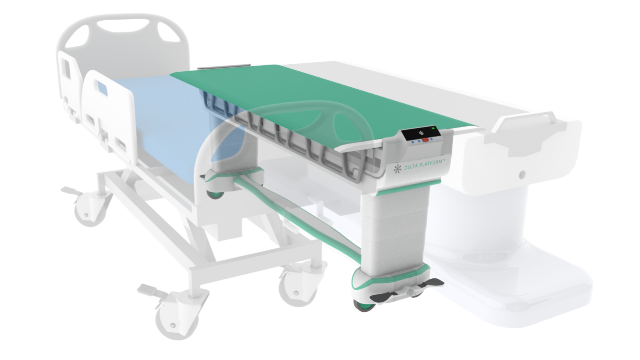
By Annie Webb and Margaret Polanyi
The need has never been greater for technologies and services that benefit older Canadians and their caregivers—so it’s no surprise that the 2020 AGE-WELL National Impact Challenge attracted a lot of attention.
The national competition recognizes top start-ups and supports entrepreneurship in Canada’s technology and aging sector. Finalists are challenged to explain how their technology-based solution can positively impact seniors or their caregivers.
The first two competitions in the three-part series played out virtually in June and July, with five finalists competing at each event for $20,000 in cash, as well as in-kind prizes.
And the winners are…
Able Innovations
Able Innovations won the Toronto regional competition, held on July 9, for its “effortless” automated patient-transfer technology. Founder and CEO Jayiesh Singh told the judges that the DELTA Platform allows a single caregiver to transfer a person in a safe and dignified manner.

“Our device is mobile, compact and easy to use,” said Singh, who first encountered the challenges around patient transfer while volunteering in long-term care homes in his youth.
Current methods of transfer require two or more caregivers in a process that is time-consuming and physically demanding. It can also lead to transfer-related injuries, both for staff and patients, said Singh.
Able Innovations’ smart technology uses compact platforms to safely roll underneath individuals being transferred. An AGE-WELL-supported study done with Bruyère Research Institute and Carleton University has helped to perfect the system and demonstrate its safety and efficacy.
“Right now, we’re focusing on lateral supine transfers, so people who are lying down can be transferred to another surface where they are lying down. It could be bed to bed, or bed to stretcher, or a stretcher to an imaging table,” explained Singh.
Single caregiver, contactless transfers will not only protect staff and patients from injuries, but also curb the spread of infections in health-care facilities and free staff from labour-intensive patient transfers, said Singh.
Able Innovations plans to use the $20,000 prize money to help deliver full-scale prototype devices to hospitals who want to test them by the end of 2020. The company is also looking to secure pilot facilities and has recently opened a seed round of financing to accelerate their path to commercialization.
Able is aiming to commercialize the DELTA Platform by mid-2021, with a home version to follow. “The demand for products such as ours is only going to grow due to what’s happening with COVID-19, our aging population and the compounding effect of nursing shortages,” said Singh.
Novalte
Novalte tied with eNable Analytics for first-place in the Atlantic Canada competition, held on June 18. Novalte is a Halifax, Nova Scotia-based smart tech solution company whose goal is to help people with mobility challenges easily control their daily living environment.
Technology and smart devices have enormous potential to help older adults with mobility challenges live a more independent life and reduce pressures on caregivers. However, not all technology is intuitive to use or even fix when it stops working.
Michael Cullen, founder and CTO of Novalte, has developed an elegant solution to this problem by launching the world’s first fully-integrated daily living platform. Novalte deploys smart technology to people with mobility challenges but removes the complexity, so that they can easily take control of their environment and break barriers to living independently.
The system, called Emitto, is already deployed on the market to organizations that support individuals with mobility challenges. Users can easily turn on/off their TV, lights or fans, change TV channels, control temperature, open doors, adjust their hospital beds and more via voice or a switch for users who cannot speak. The service also connects them with their loved ones, anywhere in the world, via smart screens—something that’s even more of a priority now with COVID-19 and social isolation.
“The best way to describe it would be a super smart home system that can be used in a care environment, facility or at home,” explained Cullen. Novalte also takes care of training the individual and any technical issues so that the user can control their environment without the help of staff or nurses.
“For most of my clients, their only problem is interfacing with the world. The world was designed for able-bodied people,” said Cullen. “We just needed that bridge to make the real-world work for them using the best method for the individual—and everybody is different. So, we needed a tool that was flexible enough to work very easily for anybody.”
What makes the service unique is the remote features, which remove the barrier of technology for individuals and their circle of care so that they can just focus on the benefits. The service improves quality of life as users do not need help for simple tasks, feel empowered and independent, while caregivers can better manage their time.
Novalte will use the AGE-WELL prize to hire a firmware engineer to help move the product to the next level in terms of adding more devices to the system. “This is absolutely fantastic,” Cullen said about the prize. “AGE-WELL has been a massive part of the evolution of who we are, and we are grateful for their ongoing support.”
eNable Analytics
More than one million Canadians use a walking aid and as our population ages, demand will only grow. Most seniors will experience a gradual loss of muscle, balance and mobility, which can increase the risk of falls. Mobility issues and the fear of falling can prevent seniors from getting out and remaining active.
eNable Analytics, which shared first place in the Atlantic competition, is using technology to help older adults with mobility concerns stay engaged and maintain their independence without compromising their safety. The start-up, based in Fredericton, New Brunswick, has developed and tested a line of smart-assisted devices, such as walkers, rollators and canes, which help users go about daily activities safely.
All devices look and feel like a regular walking aid, but they are augmented with remote monitoring sensors and use machine learning-based analyses to provide regular and proactive insights about physical and behavioural health. The devices were developed in a lab and tested with end-users in collaboration with physicians and physiotherapists.
“We can see what kind of surface you’re walking on, if you favour your left or right foot, the length of your steps, your balance etc.,” explained Alex Roberts, entrepreneurial lead at eNable Analytics. “We also have sensors measuring how much pressure you put on your cane or walker.” The real value, he said, is in the data and analytics done behind the scenes.
“We can identify the things that lead up to somebody falling and jump in early to suggest exercises or interventions to prevent the fall altogether,” he said. The devices can give older adults and their loved ones the peace of mind they need to age-in-place through regular feedback and via notifications about changes or trends.
A near commercial-ready product will soon be launched into the Canadian market. Devices will be sold at near-cost to facilitate adoption of the platform, and end-users (seniors, loved ones or circle of care) will pay a monthly subscription fee to unlock premium features, including regular activity and trend reports, and social networking. Physicians, therapists or care facilities, who may adopt the platform for multiple patients or residents, can subscribe to a health professional account to receive additional medical analytics and population summaries.
“The prize will be a big help for us to polish our software development and start rolling out devices into the community soon,” says Roberts. “From there, we’ll expand out to the province, the country and eventually around the world. The goal is to get it into as many hands as possible and help as many people as we can.”
AGE-WELL welcomes the winning companies into its network, where they will be nurtured to maximize their impact on the lives of Canadians. Thanks go to all the finalists, the judges and also the sponsors of the competition: Aging2.0 Local I Halifax Chapter, BC Seniors Living Association, Bereskin & Parr LLP, CARP, IBM Canada Ltd., Impact Centre, Innovacorp, Innovation PEI, New Brunswick Innovation Foundation, Ontario Brain Institute, Spectrum Health Care, and YouAreUNLTD.
Don’t miss the third and final event in this exciting series, to be held on September 29 via livestream, in conjunction with the BC Seniors Living Association annual conference. For details, go to www.agewell-nce.ca.
Annie Webb is a Montreal-based freelance writer. Margaret Polanyi is Senior Communications Manager at AGE-WELL. AGE-WELL is a federally-funded Network of Centres of Excellence. The pan-Canadian network brings together researchers, older adults, caregivers, partner organizations and future leaders to accelerate the delivery of technology-based solutions for healthy aging. For more information, visit www.agewell-nce.ca

